- Home
- M G Vassanji
When She Was Queen Page 3
When She Was Queen Read online
Page 3
As she approached them the boys made a remark so obscene, later she couldn’t even repeat it to herself; reciting “Ya Ali, Ya Ali,” rapidly under her breath, she sped past them. A partly sucked orange came flying, hit her front wheel; she braked, too late realizing she shouldn’t have. The bicycle stopped, keeled over, though Anaar saved herself in time from falling down. Her shame preserved, like Draupadi’s in the legend.
She started telling off the boys: “Aren’t you ashamed of yourselves—don’t you have mothers and sisters of your own—” That always took care of grossness in men, the mention of their mothers and sisters. They laughed, made an obscene remark about sisters, but just then a white Cortina came by and stopped. She knew the driver, her friend Guli’s mamu, Amir Uncle. He got out of the car and told off the boys, not too harshly but quite sternly; and he told off the men, who had been playing cards and not come to her aid. One of them spoke out impatiently, not even looking up from the game to waste his time, “What does she expect, wearing a skirt and riding a bicycle—and at this time!”
At which Amir Uncle said, “That’s the school uniform, don’t you know that—in which world do you live? Take a close look at the calendar next time and check the year!”
Another man said, “Keep her at home, she’s of age.”
The boys tee-heed. Nevertheless, one of them assisted Amir Uncle to lift the bicycle onto the roof rack, and Amir Uncle drove Anaar home, admonishing her all the way about how late it was for a girl. “Who is the drama teacher, anyway—Mr. Gregory? Mr. Fernandes?”
“Both,” she told him.
Anaar was sixteen years old.
She was always a rebel, Anaar says, these many years later in Toronto. She and her husband of twenty-three years have agreed to a divorce, and I have just listed their house for sale. I have also agreed to help her find a place to stay, which goes beyond my duties as real estate agent. But I am also a mukhi, a sort of father in our community, though she is no more than two years younger than me. As we sit together in a coffee shop, after having looked at an apartment, I feel somewhat compromised. People do talk, though in this section of town hardly anybody would know us.
Always a rebel, she says—wanting to do different, waiting to get away—which is why, though only partly why, she decided to move to Canada.
“That bike, for instance—it was a ladies’ bike even though it was bought for the use of both my brother and me—more for him since he was a boy.”
They were mongoose and snake, she and her brother; hated each other to obsession. He was a year and a half younger and into bad company from the beginning.
The beginning was when her father died and her mother remarried. Her parents had lived upcountry in the town of Dodoma in central Tanzania. Her mother went to live with her new husband in Uganda, and later in Congo. The kids were parcelled off first separately to two relatives on her mother’s side, and shortly thereafter reunited in the home of their father’s younger brother. They were treated well, perhaps too well. Anaar was nine. Their aunt and uncle had a son, their only child, a year after Anaar and her brother were adopted.
Anaar never forgot her parents’ home, Dodoma, the gulley—or alley—in which they lived, the tinsmiths knocking pots and pans into shape, the sweetmeat shop, the open drain, the quarrels among the women, the local crazy shuffling along followed by a train of boys. She spoke about that home to hurt her uncle and aunt when she wanted to taunt them, when she needed something so badly she didn’t care about anybody else: she was an orphan, sort of, was her defence of last resort.
But she helped to raise their child, Azim, who always called her his sister; and she cooked in the house, especially when both her aunt and uncle were needed in the shop during month-end rush.
By my teenage years I lived with my family in Upanga, an Indian suburb closer to the schools and the beach, away from the bustle of Kariakoo and Uhuru Street where Indian shops serviced African needs. I think I saw Anaar for the first time after school one Saturday (which was a half day) when I came walking along her street accompanying a friend to his home. She came gliding up on the opposite side of the street, erect on her bike seat, quite modest in her green box-pleat skirt and white blouse—the school uniform—her hair done up in a long pigtail. I remember stopping and turning around to watch as she went by. She alighted swiftly outside a corner store, stood the bike, which a boy, her brother, then took and pedalled away. He went past us, taking his hands off the handlebars, stretching them out sideways in an act of bravado.
That vision of a slim, fair, thin-faced girl approaching on her bicycle is, in the constellation of memories of my hometown, a bright star, something that draws a wistful smile. We looked down our noses at Kariakoo, those of us from Upanga. Contrasted with Kariakoo’s dusty hustle and bustle, its homes huddled behind shopfronts or stacked closely above the stores in apartments, we had what we would now call townhouses, with ample gardens, and friendly alleys and playing fields. But Kariakoo from that day onward also had this genie, the only girl I had seen in Dar on a bicycle; the place was now home to a certain mystery, an enigma.
She had, as I recall further from that day, a certain sternness in demeanour, an intensity in the eyes as she concentrated on the road in front of her; and the tight pigtail gave a prominence to her cheekbones and forehead.She is not as thin-faced now, but it is hard not to superpose that face from long ago upon the one before me and see a match. And it is as hard not to feel the force of an enigma, even now. Her voice is soft and I’ve not seen her laugh, but she smiles warmly and searchingly as she looks into your eyes.
Her Amir Uncle, Anaar’s girlfriend Guli would say, was more like a brother or cousin; he was a bachelor and liked to play games—“You should see him at the picnics”—and flirted with the women. He was not as old as the other uncles either.
Anaar too began to call him Amir Uncle. And to her too he was more like an elder brother who said silly things sometimes and made jokes and was protective. As a person from Upanga, who worked as a comptroller at the European firm of Twentsche Overseas Motors, he had a status; at work he wore white shorts, shirt, and stockings, with black shoes, as the Europeans did. Before, she had hardly been aware of him, but now that she knew him, he seemed to be everywhere, known to everyone. One Sunday she went with Guli to their family picnic and she saw for herself what her friend had meant. Amir Uncle was the star of the event—he played cricket with the boys, using a coconut branch for bat and a tennis ball; afterwards with the younger men and women he played hutu-tutu, the territorial game with two teams, and he entertained everybody by his teasing and baiting of the opponents. He helped in making tea, and after tea he played cards.
His only handicap, if you could call it that, was that he was not very tall.
“Why doesn’t Amir Uncle marry?” Anaar asked Guli. “He could get a wife like that—” she snapped her fingers smartly.
“He’s too picky,” Guli replied. “All those single girls who were at the picnic are simply dying to see whom he’ll pick. One of these days….”
The “single girls” were more like women, ten years older than either of them, and none of them looked very pretty to Anaar.
“None of them married properly,” Anaar says to me. “It’s amazing isn’t it, they were in their twenties and their lives had run out.”
There were five of these women and, as we observe together, all had completed high school, which was a rare feat in their time. One never married, four married widowers with children. Two died of breast cancer, one was murdered in Miami; one is divorced and lives somewhere in Toronto. We discuss her whereabouts, Anaar and I. In Toronto you locate a person not by the area they live in—this is a large city, spread out—but by the mosque they attend; that’s like a postal code—and if you think about it, guarantees where you’ll find the person on a Friday evening. I am the mukhi of Don Mills; Anaar has been attending York Mills; and this woman we spoke of goes to Eglinton. A far cry, this geometry, from the one in our memo
ries.
Amir Uncle brought movie passes for Guli and Anaar, and since the two girls had to be accompanied, he went with them. They liked Indian movies, which he didn’t much care for, and this made them giggle to themselves since it was they who were younger and supposed to be more modern. She didn’t mind that he made fun of the movies afterwards—you went for the songs and the romance and (as everyone who loved them knew) you simply ignored their lack of realism—the last-minute recognition of a lost son, the weepy hospital scene, or the obviously artificial full moon behind a tree! After every such outing with Amir Uncle, Anaar would be bursting with praises for him, until her aunt finally began calling him “your Amir Uncle.”
With Amir Uncle, too, she got a taste of things they could not quite afford in her family—such as ice cream at Naaz Restaurant in the evenings, and the drive on Ocean Road to look at all the beautiful houses of the Europeans and other rich people and stop later by the sea and listen in silence to the waves. A taste of that other life, of well-being, which she so longed for. Where she lived, by seven the street was dark and quiet—the shops would be all closed, their owners huddled upstairs or behind the stores with their families and radios. There would be news on the radio, perhaps followed by a drama, and two nights a week half an hour of pop music, Monday’s “Happy Returns” and Friday’s “Favourites.” Lights out at ten, the absolute latest.
Amir Uncle came like a ray of light, a happy beam, into that drab life.
“If there’s one thing I don’t miss from those days, it’s those still, still nights,” she says. “And yet there was a strange mystery to them … something unforgettable … we were more religious then, too.”
“Yes.”
“Are you religious?”
I cast an appropriate stare at her. “I am a mukhi,” I answer, as if that explains everything.
The coffee shop on North Toronto’s Yonge Street is abustle with wealthy young couples out shopping. Time was, on this drag you’d find maybe one or two eating places open this late and serving “Canadian coffee” (Maxwell House institutional brand); now the coffee houses selling fresh and fancy brews sit cheek to jowl, and you can bet in the course of time, perhaps in the lull after Christmas, a few of them will be smothered right out of the competition, what with an American chain joining in the fray and upping the ante.
We’ve come here having inspected a show unit for a condo development coming up in the area, one of those with fancy names like Governor’s Terrace to make you feel you are partaking in the opulence previously reserved for colonial British sahibs. She liked it and thinks she’ll rent an apartment in the area while she waits for possession.
“You’re selling her house—you’re not obliged to find her a place to stay,” my wife Farida chides.
“It’s good business,” I respond. “Besides, she’s a woman alone and—”
“Exactly.”
“Don’t tell me you’re jealous—”
She smiles.
“I am the mukhi,” I continue, “and it’s our duty to help—don’t forget, you’re mukhiani-maa—”
Maa means “mother,” but in a respectful way, though these days it’s not always likely to be taken as a compliment even by grandmas.
“We were in school together, I am hardly her mother,” Farida says, though the term does please her, I’m surprised.
Farida looks no older than Anaar at all.
“Did you find out why,” she says, raising an eye, “you know—she did what she did at the funeral?”
“No—I don’t think she knows that I know.”
“Not a good detective, are we?”
She had been seeing Amir Uncle for more than a year before she realized she’d been doing exactly that. There would be times when Guli failed to show up at a planned outing and Anaar would be with him by herself—except for her cousin Azim, who always came with her; that was nothing unusual, girls took along a little brother the same way they would a shawl or a sweater. And Azim was so quiet, it was almost as if he were not there.
When school holidays came around, Guli and Anaar decided they would attend early morning mosque, which began at four every day. Amir Uncle would give them a ride. But after the first two mornings, Guli couldn’t get up, felt too lazy, and so it was Anaar and Amir Uncle, of course with Azim, who went. On the way back Amir Uncle would take the two of them for a drive past the seashore; one day he said to Anaar, “Why don’t I teach you how to drive?”
It was the most thrilling thought for Anaar; to be able to drive a car! So she and Amir Uncle, with the quiet, half-absent Azim in the back of the car, went for driving lessons early in the morning after mosque. And after the holidays, it was the same trio who went to a movie, the Little Theatre, or somewhere else. Her guardians believed she went out with her friend Guli, and she didn’t tell them otherwise. Neither did her silent chaperone Azim. Anaar believed that he too liked the outings in the car, and the treats, and Amir Uncle. Sometimes she would receive a message through Guli, about a play or a dance performance, the office Christmas party, or even a tennis or cricket match. Twice there were presents, purportedly from her friend Guli—a bead necklace and a gold bangle—and her aunt and uncle despaired of how to repay the gifts.
But one day Mrs. Daya, the gossip across the street, alerted her aunt, who interrogated Azim, and the fat was in the fire.
In the next several weeks Anaar declined all invitations from Amir Uncle, which were brought of course by their messenger Guli: to attend the final of the Youth Drama Competition, for which tickets were so scarce; to attend the New Year’s party at Twentsche Overseas Motors; to go and hear a qawali recital by the famed Shakila Banu Bhopali and her troupe from India. Finally, one time Amir Uncle followed her in his car as she was returning from school on her bicycle; she stopped, at the Odeon; her bike went on the roof rack and she sat in the car. And she told him, “It’s not right—to go out with a man—you took advantage of me.”
He was aghast, his face contorted in pain—“But I am in love with you,” he said. “I want to marry you! I want to take you into my arms and show you the world, I want to send you to a college—even to Dar University! What future do you have where you are? You want to get married one day, don’t you? Do you want to run a shop all your life? Don’t you think I’m a good man, with faith in God, and honourable, with good prospects in a foreign firm? Let me give you the world—if you didn’t care for me would you have come with me before? Have I been without honour so far—”
“Why didn’t you tell me your intentions before?” she asked tearfully, but they were reconciled. He dropped her outside the store, brought down her bicycle from the roof with the help of a servant, greeted her aunt and uncle with “God bless,” and drove away.
They glared at Anaar: “Didn’t we tell you—”
“Amir Uncle and I care for each other and we want to get married,” she declared, and blushed. What she said was not only radical and insubordinate; calling her suitor “Uncle” made her look ridiculous and childish, hardly to be taken seriously.
“Don’t be silly,” her aunt said. “The man is old enough to be your father!”
“He’s not!”
But he was.
“I went to school with him,” her uncle said quietly to Anaar, “and he was two classes ahead of me.”
Suddenly she was at the centre of a storm: neighbours, aunts, even girlfriends began talking to her of the future; how young and beautiful she was, she could have her pick of husbands. Two proposals of marriage were brought to her, both decent, from men in their mid-twenties. Her guardians promised to send her to college when she finished school; they proposed a holiday in Uganda for the coming break. And an elderly aunt put it to her bluntly: “When you are forty he will be an elderly bapa of sixty, will he be able to satisfy you?” Did this old aunt mean what Anaar thought she meant? Anaar’s knowledge of what men and women did to produce children was scant; she knew men had erections, and girls called penises “sticks,” and recentl
y when some relations from upcountry had come to visit and she had to share her bed with her ten-year-old cousin Azim, she found it, for the first time, rather awkward. She couldn’t quite tell why. She felt she’d been touched.
What thrilled her, however, was a sense of importance. She was being courted by everyone. It would be her decision what she did, that she knew. A sense of independence and maturity, of responsibility, came over her. Power. Amir Uncle, who had been like a prince descended from the sky, begged her, “Please don’t call me ‘Uncle,’” but that was so difficult! And he pleaded, “I’m only fifteen years older, not twenty, as they say.” He could bring witnesses, name references, he would bring a copy of his birth certificate, which he had applied for. And best of all, there were reports that he had turned intensely devout, spending long times at the takht in mosque, beseeching the Lord—asking Him for her, Anaar Dhalla!
When the formal proposal for marriage came from his family, Anaar was two months past her eighteenth birthday. It was brought by Amir’s (she had to call him that now) mother, a tall stout woman who ran a nursery school, who came with two of his sisters (one a teacher, the other a steno) and three elders from the community. The visitors were seated, tea was produced, with biscuits. Anaar hovered at the door to the sitting room (which was also her aunt and uncle’s bedroom) and one of the elders began:
“You know why we are here—the matter’s already at an advanced stage, so let’s not tarry.” The boy’s qualities were listed; the girl was of age; and most of all, it seemed the couple was intent on the union. “Nowhere in our tradition is it mentioned that age be a barrier to a willing couple’s marriage.”

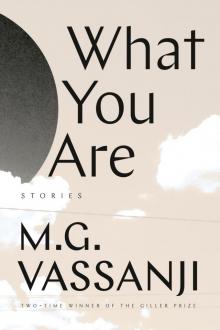 What You Are
What You Are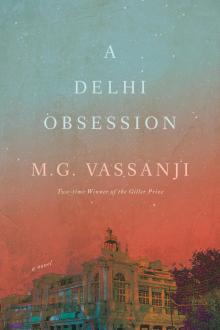 A Delhi Obsession
A Delhi Obsession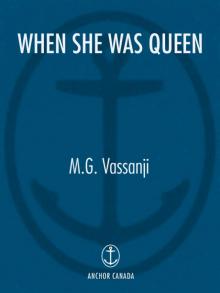 When She Was Queen
When She Was Queen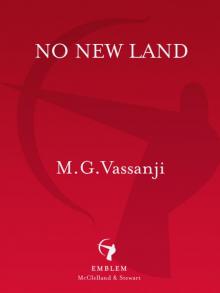 No New Land
No New Land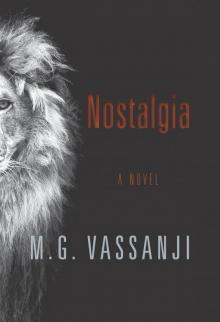 Nostalgia
Nostalgia Mordecai Richler
Mordecai Richler The Book of Secrets
The Book of Secrets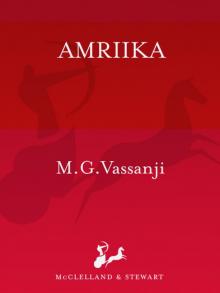 Amriika
Amriika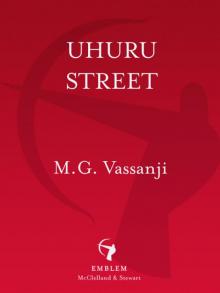 Uhuru Street
Uhuru Street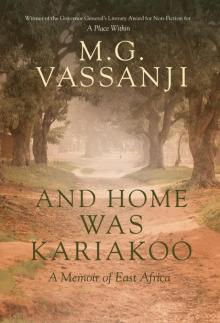 And Home Was Kariakoo
And Home Was Kariakoo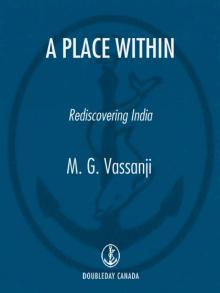 A Place Within
A Place Within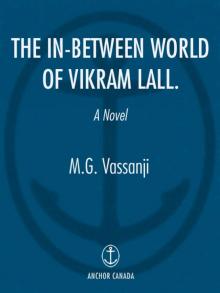 The In-Between World of Vikram Lall
The In-Between World of Vikram Lall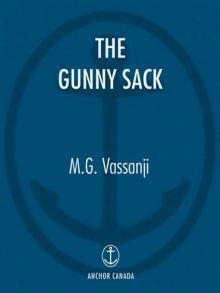 The Gunny Sack
The Gunny Sack